Burnt Money
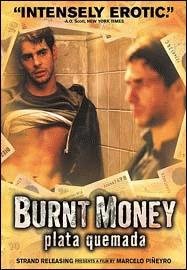
Burnt Money (Plata Quemada)
(2001)
Argentina, 1965. Angel, a drifter, and Nene, a petty thief, meet in the bathroom of a Buenos Aires train station, and from that moment they are inseparable--both as lovers and, soon, as partners in crime. Dubbed "the Twins" by the police and tabloids, they scratch out a living trawling through the Buenos Aires underworld, until a botched heist goes wrong: leaving four dead and Angel wounded. It forces them and their swaggering straight cohort Cuervo to escape to Uruguay as per the orders of their boss, the sinister Fontana. Fugitives, they are advised to remain in hiding. until their false documents are ready. Days go by and tensions mount.
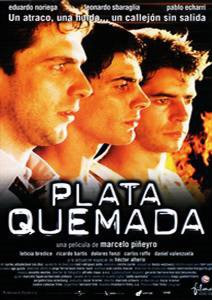 The three begin going out and attracting attention. The situation worsens when Nene, who has an unhealthy relationship with Angel, falls in love with a prostitute. Cut off from their roots and the connections, convinced they've been betrayed and are under surveillance, the Twins' world begins to close in on them, testing their love and finally their sanity.
The three begin going out and attracting attention. The situation worsens when Nene, who has an unhealthy relationship with Angel, falls in love with a prostitute. Cut off from their roots and the connections, convinced they've been betrayed and are under surveillance, the Twins' world begins to close in on them, testing their love and finally their sanity.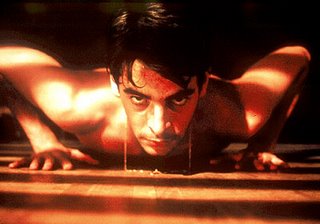
Also Known As:
Burnt Money
Plata Quemada
Vies Brulees
Logline:
About two men who became lovers and ultimately notorious bankrobbers. Set in Argentina in 1965.
Genres:
Art/Foreign, Thriller, Crime/Gangster and Adaptation
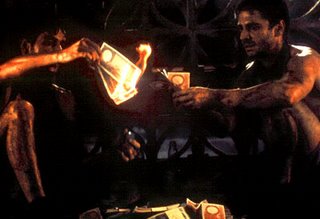
Running Time: 2 hrs. 5 min.
Produced in: Argentina
Dirección
Marcelo Piñeyro
Intérpretes
Eduardo Noriega (Ángel)
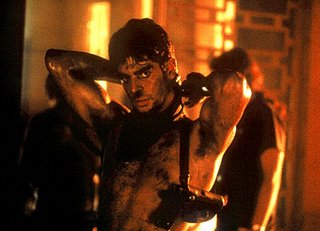
Leonardo Sbaraglia (El Nene)
Pablo Echarri (El Cuervo)
Leticia Bredice (Giselle)
Ricardo Bartis (Fontana)
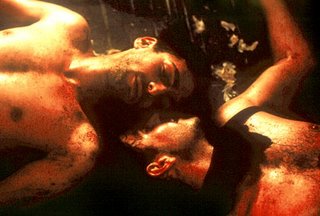
Guión
Marcelo Figueras
Marcelo Piñeyro
Fotografía
Alfredo Mayo
Música
Osvaldo Montes
Montaje
Juan Carlos Macías
Sinopsis
Los Mellizos (El Nene y Ángel) no son hermanos, son delincuentes profesionales. Fontana les propone un golpe de siete millones y Los Mellizos aceptan porque necesitan olvidar la crisis por la que atraviesa su antes perfecta asociación. En el momento clave, su extraño vínculo les juega una mala pasada. El Nene cree que uno de los policías va a herir a Angel y pierde el control de lo que se suponía que iba a ser un trabajo incruento.
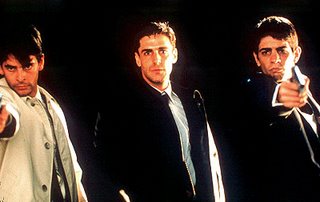
Referencias
• Dirige Marcelo Piñeyro, autor de Tango feroz, Caballos salvajes y Cenizas del paraíso.
• Es la tercera película protagonizada por Eduardo Noriega en lo que va de años tras Carretera y manta y El invierno de las Anjanas y Leonardo Sbaraglia, que ya había trabajado con el director en Tango feroz, Caballos salvajes y Cenizas del paraíso.
• Debido a su tratamiento no condenatorio de la homosexualidad, la película ha obtenido la poco habitual calificación de "No autorizada para menores de 18 años" en Argentina y ha sido prohibida en varios países latinoamericanos.
• Se basa en un hecho real que sucedió en Buenos Aires y Montevideo entre el 28 de septiembre y el 4 de noviembre de 1965. Este hecho propició la edición de una novela escrita por Ricardo Piglia.
• Se presentó en una sección paralela del Festival de Cine de Venecia 2000.
• Consiguió el Goya a la mejor película extranjera de habla hispana.
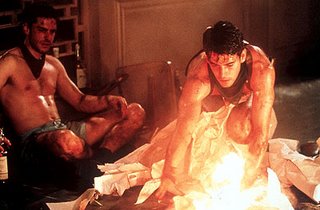
"The relationship between Angel and Nene is one of the most passionate, destructive, uncompromising depictions of love in all its blood-soaked sordidness that I've seen in a long time. These are not nice guys. They are wounded and fierce and protective of each other. So complex a relationship needs time to develop on film and director ,Marcelo Piñeyro, isn't afraid to give it to them. We share the sweltering boredom of their exile, the desperation of Nene's love for Angel and Angel's wordless, psychotic attempts to save Nene. These great actors can say it all in a single look. It is one of the most intensely erotic and romantic film I've seen in a very long time.This is a movie that will stay with me."
" I won't rehash the details again, as so many previous comments have done wonderful jobs on discussing the plot and technical aspects of this film.
I want to commend the leads on their brilliant job. Often when (male) actors are asked to "play gay" you get an overly sexualized relationship - as though they feel the only way to portray the connection between men is through overt lust.
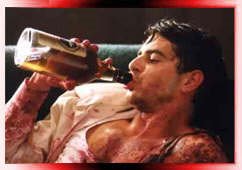
The director and actors here, have instead sought out a more subtle, but infinitely more honest portrayal. Every touch and sidelong glance between Nene and Angel just burns with intimacy. They might have the least on-screen sex, but this is the relationship that you really believe. The actors truly seem comfortable with their bodies, with touching one another, and so whether they are touching or just looking at each other - you can feel that familiarity they share and the intimacy translates beautifully onto the screen. Really an amazing performance of body-language.
My one complaint about "Plate quemada" is the rather shoddy subtitles. I can understand enough of the language to be able to pick up when the sub's aren't direct, or are leaving out dialogue. I HATE that. In a film such as this, when so much of the plot depends on the characters and their relationships, it becomes agonizing not to know exactly what they're saying."
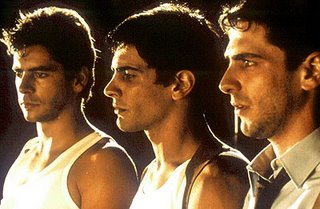
Based on true events recounted in a non-fiction novel by Argentinian writer/critic Ricardo Piglia, and directed by former producer Marcelo Piñeyro (THE OFFICIAL STORY), BURNT MONEY is a masterpiece. Photographed with noirish intensity by Alfredo Mayo (HIGH HEELS) and underscored by an ironic soundtrack of lazy jazz and contemporary English/Spanish pop songs, the narrative is driven by powerful emotions which explode at regular intervals in outpourings of explicit sex and violence. The sacred and profane are interlinked in various ways (one extraordinary sequence cross-cuts between an act of worship in a Uruguayan church and an unpleasant encounter between Nene and a frightened youth in a public toilet), and the sweaty atmosphere is broken only by an explosive climax where the main protagonists are forced to take responsibility for their actions. Former TV actor Pablo Echarri ("Chiquititas", "El Signo", etc.) plays a younger, headstrong member of the outlaw gang, blinded by youthful arrogance to the danger in which they have all become enmeshed, while Brédice (NINE QUEENS) plays one of the few significant female characters in this otherwise all-male scenario, a brittle creature who falls in love with the wrong guy, with appalling consequences for everyone around her.
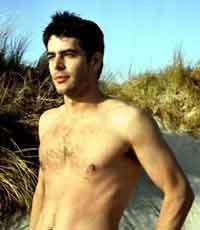
More than anything else, however, BURNT MONEY is a love story, played to perfection by two of the finest young actors of their generation. Spanish heartthrob Noriega forged his career in popular mainstream entries such as THESIS, OPEN YOUR EYES and THE DEVIL'S BACKBONE, while Sbaraglia plied his trade alongside Piñeyro in the lower echelons of Argentinian cinema (TANGO FEROZ LA LEYENDA DE TANGUITO, CABALLOS SALVAJES). Casting these two beautiful, experienced young men as lovers in a violent true-crime drama could not have been more fortuitous: Their devotions are rarely consummated on-screen (all of the aforementioned sex scenes are heterosexual), except for a chaste kiss at the end of the film, and an earlier, erotically-charged sequence in which Nene tends to a wound on Ángel's shoulder and initiates a sexual advance, only to be rebuffed because of Ángel's mental condition. And yet, Noriega and Sbaraglia are ultra-convincing as the macho thugs who would literally die for one another, and they invest every gesture, every inflection, with genuine romantic chemistry. These guys simply burn up the screen! Look out for the devastating sequence in which Nene 'confesses' to Brédice about his relationship with Ángel, where he describes their mutual affection with heartbreaking emotional candor.
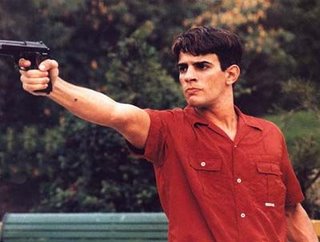
To his credit, Piñeyro refuses to soft-pedal the dissolute nature of his central characters. But for all its dramatic fireworks and sexual tension, BURNT MONEY is a tale of steadfast devotion, as touching and beautiful as any this reviewer has ever seen. They may be thieves and murderers, but when Nene looks into Ángel's eyes, you know instinctively that their love transcends life and death, and is destined to last an eternity. Not just a great gay film, BURNT MONEY is also a terrific love story, a heartstopping thriller, and an outstanding example of popular Spanish entertainment.
Leonardo Sbaraglia
 Este Porteño moreno y de ojos verdes de amplia sonrisa y mirada penetrante nació el 30 de Junio de 1970 en Buenos Aires, Argentina. Cercano, amable y educado es hombre de teatro. En Argentina se le considera uno de los actores más prometedores de la última generación y en España, también. Su madre, Roxana Randón, maestra de arte dramático fue uno de sus grandes estímulos para tomar su vocación en serio. Debutó a los once años cuando el hacer pequeños papeles lo consideraba como un juego. A los trece años empezó su preparación teatral y a los dieciséis fue uno de los protagonistas en su primer largometraje , "La noche de los lápices", de gran dureza donde se relata la historia de un grupo de estudiantes asesinados durante la última dictadura argentina. Al año siguiente fue uno de los protagonistas de "Clave de sol", telenovela juvenil que se mantuvo en antena durante cinco años. Si tuviera que citar directores españoles con los que me gustaría trabajar mencionaría a Julio Médem, Pedro Almodóbar y Fernando Trueba
Este Porteño moreno y de ojos verdes de amplia sonrisa y mirada penetrante nació el 30 de Junio de 1970 en Buenos Aires, Argentina. Cercano, amable y educado es hombre de teatro. En Argentina se le considera uno de los actores más prometedores de la última generación y en España, también. Su madre, Roxana Randón, maestra de arte dramático fue uno de sus grandes estímulos para tomar su vocación en serio. Debutó a los once años cuando el hacer pequeños papeles lo consideraba como un juego. A los trece años empezó su preparación teatral y a los dieciséis fue uno de los protagonistas en su primer largometraje , "La noche de los lápices", de gran dureza donde se relata la historia de un grupo de estudiantes asesinados durante la última dictadura argentina. Al año siguiente fue uno de los protagonistas de "Clave de sol", telenovela juvenil que se mantuvo en antena durante cinco años. Si tuviera que citar directores españoles con los que me gustaría trabajar mencionaría a Julio Médem, Pedro Almodóbar y Fernando TruebaEn 1993 comenzó su fructífera relación profesional con el director Marcelo Piñeyro con el que ha rodado títulos como "Tango feroz", "Caballos salvajes", "Cenizas del paraíso" o "Plata quemada" ganadora en el 2000 con el Goya a la Mejor Película Extranjera en Lengua Hispana quien le abrió definitivamente las puertas al cine español.

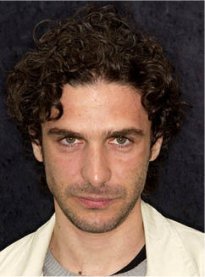 A partir de entonces Leonardo Sbaraglia se vino España a probar suerte. Fue de la mano de un cineasta nóvel, Juan Carlos Fresnadillo, que Leonardo Sbaraglia entró con todos los honores en la gran pantalla de los cines de España con "Intacto" que logró dos premios Goya una para el director y otra para Leonardo quien emocionado no pudo menos que acordarse de su país y de su amor, Lupe. En el 2001 rodó cuatro película demostrando su versatibilidad como actor y que actualmente es un valor seguro en aquello que realiza.
A partir de entonces Leonardo Sbaraglia se vino España a probar suerte. Fue de la mano de un cineasta nóvel, Juan Carlos Fresnadillo, que Leonardo Sbaraglia entró con todos los honores en la gran pantalla de los cines de España con "Intacto" que logró dos premios Goya una para el director y otra para Leonardo quien emocionado no pudo menos que acordarse de su país y de su amor, Lupe. En el 2001 rodó cuatro película demostrando su versatibilidad como actor y que actualmente es un valor seguro en aquello que realiza.Soy una persona superafortunada. Pero es una fortuna que me ha costado mucho esfuerzo.
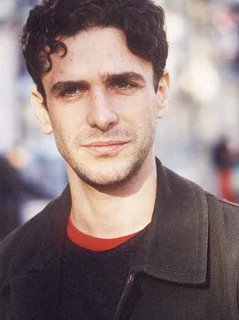 Creo que mi mayor virtud es ser muy concienzudo. El tema no es tener grandes oportunidades, sino aprovecharlas y saber sostenerlas. Sé bastante, sí, pero me queda mucho por saber. Y no sólo como actor
Creo que mi mayor virtud es ser muy concienzudo. El tema no es tener grandes oportunidades, sino aprovecharlas y saber sostenerlas. Sé bastante, sí, pero me queda mucho por saber. Y no sólo como actorEduardo Noriega
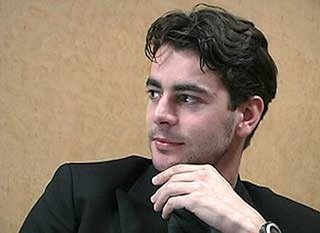 Eduardo Noriega, que el mismo se considera "terco como una mula", nació el 1 de agosto de 1973 en Santander. Es el pequeño de siete hermanos y el único de ellos que se ha dedicado a la interpretación. De pequeño quería ser cura o futbolista. Le gusta el cine, la lectura y como no, el fútbol. Ahora es socio del Rácing de Santander y forofo del Barça Fumador empedernido Eduardo Noriega estudió en un colegio de curas y durante cinco años estudió solfeo, armonía, coral y piano en el Conservatorio de Santander.
Eduardo Noriega, que el mismo se considera "terco como una mula", nació el 1 de agosto de 1973 en Santander. Es el pequeño de siete hermanos y el único de ellos que se ha dedicado a la interpretación. De pequeño quería ser cura o futbolista. Le gusta el cine, la lectura y como no, el fútbol. Ahora es socio del Rácing de Santander y forofo del Barça Fumador empedernido Eduardo Noriega estudió en un colegio de curas y durante cinco años estudió solfeo, armonía, coral y piano en el Conservatorio de Santander.  Su afición al teatro le llevó a Madrid a estudiar en la Escuala Pública de Arte Dramático dejando de lado su carreta de Derecho. Allí conoció a Fele Martínez y Eloy Azorín.
Su afición al teatro le llevó a Madrid a estudiar en la Escuala Pública de Arte Dramático dejando de lado su carreta de Derecho. Allí conoció a Fele Martínez y Eloy Azorín."Una amiga me dijo en un bar que iba a clases de teatro, me picó la curiosidad y un día fui a verla con un amigo. Mi amigo desapareció y el director me hizo subir e interpretar. Al año siguiente, y para seguir curioseando me metí en la escuela de Arte Dramático de Santander y, un año después, cuando terminé el colegio, me matriculé en Derecho, también en Santander, pero a la vez presenté toda la documentación para las pruebas de acceso de la Escuela de Arte Dramático de Madrid.
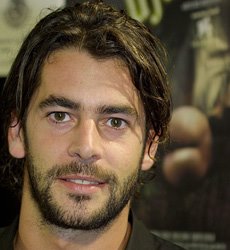 Sabía que era muy difícil entrar y cuando me llamaron pasé dos días de duda, pero finalmente anulé la matrícula de Derecho y me lancé a venir a Madrid"
Sabía que era muy difícil entrar y cuando me llamaron pasé dos días de duda, pero finalmente anulé la matrícula de Derecho y me lancé a venir a Madrid"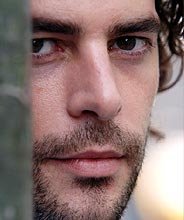

Después de rodar varios cortos con Carlos Montero, Alejandro Amenábar y Mateo Gil, entre otros, debutó en el cine con "Historias del Kronen" de Montxo Armendáriz. Con su siguiente película "Tesis" de Alejandro Amenábar consiguió que todo el mundo empezase a fijarse en él. En esta película trabajó con su actor favorito, Fele Martínez. Después vino "Abre los ojos" también de Alejandro Amenábar que fue su consolidación como actor consiguiendo poco a poco ganarse un puesto entre los preferidos del público y de los directores españoles.
Con "Abre los ojos" tuvo una candidatura al Goya a la Mejor Interpretación Masculina. Desde entonces numerosas películas le han mantenido en la cúspide del cine nacional, películas tan exitosas como el thriller
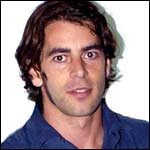 "Nadie conoce a Nadie" de Mateo Gil, la terrorífica "El espinazo del diablo" de Guillermo del Toro, la edivertida "Cha cha chá" de Antonio del Real, donde conoció y luego mantuvo una relación con Ana Álvarez, o la premiada con el premio Goya a la mejor película extranjera de habla hispana "Plata quemada" del argentino Marcelo Piñeyro. Consiguió el premio Mejor Actor del AICA y el del Festival de Alcalá de Henares. También Fue galardonado con el Premio al Mejor Actor en el Festival de cine de Menorca por "La fuente amarilla" de Miguel Santesmases.
"Nadie conoce a Nadie" de Mateo Gil, la terrorífica "El espinazo del diablo" de Guillermo del Toro, la edivertida "Cha cha chá" de Antonio del Real, donde conoció y luego mantuvo una relación con Ana Álvarez, o la premiada con el premio Goya a la mejor película extranjera de habla hispana "Plata quemada" del argentino Marcelo Piñeyro. Consiguió el premio Mejor Actor del AICA y el del Festival de Alcalá de Henares. También Fue galardonado con el Premio al Mejor Actor en el Festival de cine de Menorca por "La fuente amarilla" de Miguel Santesmases.Pablo Echarri
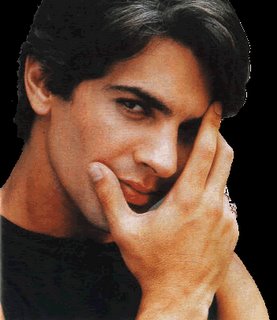 Pablo Daniel Echarri nació en Villa Dominico el 21 de septiembre de 1969, en la Clínica "El hispanoamericano" de Avellaneda. Hincha fanático de Independiente, se define a sí mismo como "un pibe de barrio". Terminó el secundario y casi se convierte en Maestro Mayor de Obras, pero necesitaba encontrar su vocación. Por eso hizo cursos de plomería, judo, dibujo e inglés. Trabajó vendiendo bisutería en la calle, fue cadete y empleado en una tienda de ropa. A los 18 años empezó a estudiar teatro con Lito Cruz y se dio cuenta que quería ser actor. Alguien le aviso que Canal 9 estaba haciendo un casting para encontrar a la contrafigura de Pablo Rago en "Amigos son los amigos". Quedó, pero al tiempo se dio cuenta que habían tomado a otro actor. Cuando tenia 23 años llego su oportunidad: lo llamaron para trabajar en "Solo para parejas" donde actuó junto a Victoria Onetto y Emiliano Kackzca, entre otros.
Pablo Daniel Echarri nació en Villa Dominico el 21 de septiembre de 1969, en la Clínica "El hispanoamericano" de Avellaneda. Hincha fanático de Independiente, se define a sí mismo como "un pibe de barrio". Terminó el secundario y casi se convierte en Maestro Mayor de Obras, pero necesitaba encontrar su vocación. Por eso hizo cursos de plomería, judo, dibujo e inglés. Trabajó vendiendo bisutería en la calle, fue cadete y empleado en una tienda de ropa. A los 18 años empezó a estudiar teatro con Lito Cruz y se dio cuenta que quería ser actor. Alguien le aviso que Canal 9 estaba haciendo un casting para encontrar a la contrafigura de Pablo Rago en "Amigos son los amigos". Quedó, pero al tiempo se dio cuenta que habían tomado a otro actor. Cuando tenia 23 años llego su oportunidad: lo llamaron para trabajar en "Solo para parejas" donde actuó junto a Victoria Onetto y Emiliano Kackzca, entre otros.Sin duda con el tiempo se fué transformando en uno de los actores argentinos mas codiciados. Fué así que trabajó en varios programas televisivos como "Inconquistable corazón", "Sólo para parejas", "Mujercitas", "Mía, sólo mía", "Los buscas de siempre" y "Resistiré".
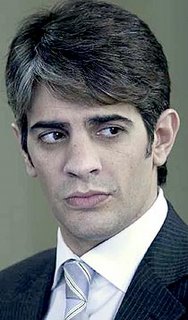 La televisión le dio pie para afianzar su carrera e introducirse en el mundo
La televisión le dio pie para afianzar su carrera e introducirse en el mundo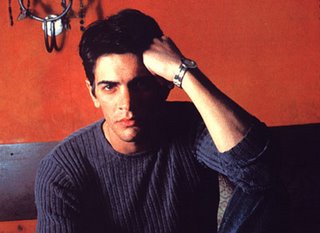 cinematográfico. De esta forma, protagonizó películas como "Sólo gente", "El desvío", "Alma mía", "Héroes y demonios", "Plata quemada", "Apasionados", "No debes estar aquí" y "El séptimo arcángel
cinematográfico. De esta forma, protagonizó películas como "Sólo gente", "El desvío", "Alma mía", "Héroes y demonios", "Plata quemada", "Apasionados", "No debes estar aquí" y "El séptimo arcángelActualmente se encuentra casado con la actriz Nancy Duplaa, con quien tiene una hija llamada Morena.
Ése es Pablo Echarri, el gran descubrimiento de 'El Método', algo que le habrá resultado difícil, porque despuntar entre otras seis figuras del cine patrio tiene su mérito.
Su atractivo, su pelo que ya peina canas y una mirada de galán hicieron de él el perfecto actor de novelas en América Latina. Pero su suerte cambió cuando en plena crisis argentina estrenó una película con Natalia Verbeke. 'Apasionados' llegó a España y,
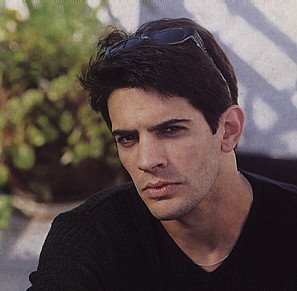 aunque no arrasó en taquilla, le sirvió como trampolín para darse a conocer aquí.
aunque no arrasó en taquilla, le sirvió como trampolín para darse a conocer aquí.Antes de esta comedia romántica participó en 'Plata Quemada', una producción argentina que ya se llevó el Goya a la mejor película extranjera de habla hispana en el año 2000. Un papel violento y controvertido con el que demostró a Marcelo Piñeyro que nada le viene grande, ni siquiera el camaleónico personaje que el director le asignó al volver a confiar en él para 'El Método'.


0 Comments:
Post a Comment
<< Home